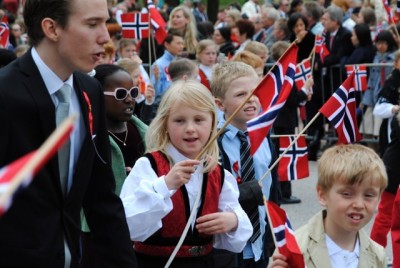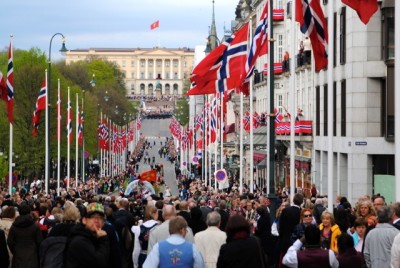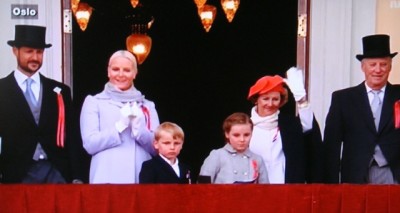New research that has surprised even those conducting it reveals that Norway’s Constitution Day on the 17th of May has emerged not as a day of nationalistic chauvinism but as the most inclusive day of the year, with solidarity cutting across ethnic, cultural and religious lines. It’s now celebrated enthusiastically by both natives and a vast majority of immigrants alike, with one immigrant from India saying it’s the only day of the year when she really feels at home.

The research, presented at a recent conference in Eidsvoll, surveyed Scandinavian attitudes towards national identity and questioned around 1,500 persons in each of the Scandinavian countries: Norway, Denmark and Sweden. The conference was held in connection with next year’s bicentennial celebrations of Norway’s constitution, and the research was tied to a state project studying the constitution as a national symbol.
The survey concluded that Norwegians were the least chauvinistic among Scandinavians, even though Norwegians’ wildly patriotic annual celebrations on the 17th of May might suggest otherwise. Norway has by far the most widespread and festive national holiday compared to Denmark’s and Sweden’s national days on June 5th and 6th respectively, which has led to recent claims that Norway is also more nationalistic. Not so, reported newspaper Morgenbladet, citing the survey’s so-called “chauvinism index” based on how those surveyed agreed or disagreed with typical chauvinistic claims like “people should support their country even when it conducts itself badly.” The index ranked Norway as the least chauvinistic with a score of 9.3 points, compared to 9.4 points for Sweden and 9.6 points for Denmark.

Researcher Pål Ketil Botvar of the Norwegian research foundation KIFO said he hadn’t expected such a result. “It was surprising how similar the three countries were, and I was surprised Sweden scored higher on the chauvinism scale than Norway,” Botvar told Morgenbladet.
Denmark scored highest of the three countries regarding skepticism towards immigration, with Sweden lowest and Norway closer to Denmark. Researchers were especially surprised, though, over the degree to which immigrants in Norway have embraced the 17th of May holiday, and how Norwegians include immigrants and foreign visitors in the celebrations.
While there have been recent controversies over carrying flags other than Norway’s in the traditional parades by school children, it’s not at all unusual to see foreign residents and visitors wearing their own national costumes in honor of the day. Scottish kilts, Japanese kimonos and saris now blend in with Norwegian bunads on the streets of Oslo, and appear to be welcomed and equally admired. Immigrants interviewed also said they often feel like the 17th of May is a day when native Norwegians actually are friendly and talk to strangers, dropping their perceived reserve and eager to share their national celebration.

Research data showed that fully 88 percent of non-western immigrants in Norway celebrate the 17th of May, nearly the same level as the 89 percent of native Norwegians who celebrate as well. Only around half of Oslo’s school students marched in the parade this year, but it still involved thousands of children and lasted for more than three hours.
Immigrants from other Nordic countries celebrate the 17th of May to the least degree, according to the research figures, but that still amounted to a substantial 82 percent), followed by other western immigrants (87 percent).
“Folks who come here are glad to be able to participate like others,” said Shoaib Sultan, chairman of this year’s 17th of May organizing committee in Oslo who was born in Pakistan but came to Norway as a toddler. Even though he’s been the target of some right-wing extremist groups who objected to his chairmanship, he said that many immigrants who don’t take part in other uniquely Norwegian celebrations do participate in 17th of May parades and gatherings. “The 17th of May is almost like a little integration project,” Sultan told Morgenbladet.
The survey seemed to suggest that Norwegians can be very patriotic without being chauvinistic. Fully 80 percent of Norwegians, for example, have used their national flag during the past year compared to 54 percent of Swedes and 75 percent of Danes. While 77 percent of Danes and 79 percent of Swedes think their constitution is “extremely important,” 87 percent of Norwegians think the same. Another 22 percent of Norwegians said they are always deeply moved when they hear their national anthem, compared to 16 percent of Danes and 14 percent of Swedes.
While many immigrants also responded that they’re moved by the anthem and celebrate the 17th of May, some other western immigrants still think the day is nationalistic and won’t join celebrations. Susanne Brandtstädter, a professor of social anthropology at the University of Oslo who’s originally from Germany, said she prefers to take a walk around a lake in the hills than watch the parade downtown.
“It’s only in North Korea that people celebrate their national day more actively,” Brandtstädter told Morgenbladet. “I’m German and we are very skeptical to all nationalism. I think it’s old-fashioned.” Navjot K Sandhu, whose parents immigrated from India, felt the opposite, saying the 17th of May “is the only day Norwegians can speak with strangers.” She said her mother thinks it’s the only day of the year when the streets of Oslo are more like the streets of Punjab, crowded and full of interaction: “It’s the day they (her parents) really feel at home.”
Views and News from Norway/Nina Berglund
Please support our news service. Readers in Norway can use our donor account. Our international readers can click on our “Donate” button:

